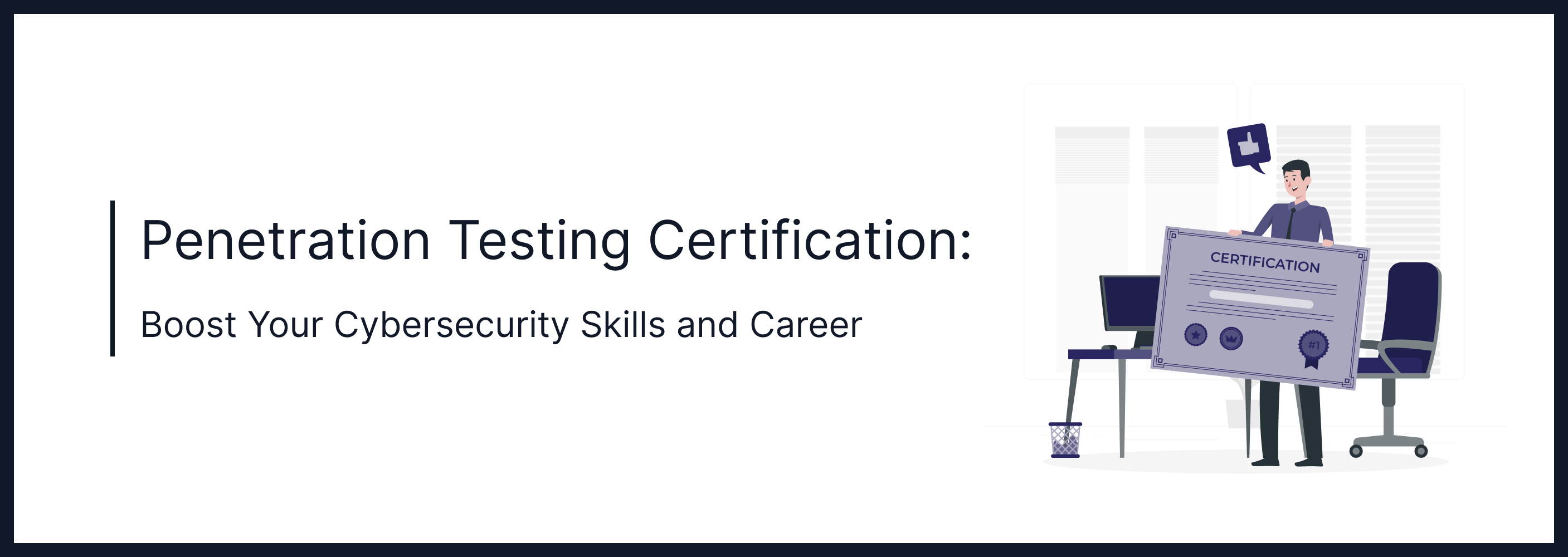
Oct 22, 2024 Information hub
Penetration Testing Certification: Boost Your Cybersecurity Skills and Career
In today’s digital age, cybersecurity has become a critical concern for businesses, governments, and individuals alike. With the increasing frequency and sophistication of cyberattacks, organizations are investing heavily in securing their digital assets. One of the most effective ways to assess and improve an organization’s security posture is through penetration testing. This process involves simulating cyberattacks to identify vulnerabilities in systems, networks, and applications. However, not just anyone can perform penetration testing. It requires a deep understanding of cybersecurity principles, tools, and techniques. This is where penetration testing certification comes into play. A penetration testing certification validates an individual’s skills and knowledge in ethical hacking and security testing, making them a valuable asset to any organization.
In this blog post, we will explore the significance of penetration testing certification, its relevance in today’s cybersecurity landscape, the benefits of obtaining such certifications, and the challenges and trends shaping the future of this field.
The Relevance of Penetration Testing Certification Today
The Growing Threat of Cyberattacks
Cyberattacks are becoming more frequent and damaging. According to a report by Cybersecurity Ventures, cybercrime is expected to cost the world $10.5 trillion annually by 2025. This staggering figure highlights the urgent need for robust cybersecurity measures, including penetration testing, to protect sensitive data and critical infrastructure.
Penetration testing helps organizations identify and fix vulnerabilities before malicious hackers can exploit them. However, conducting a penetration test requires specialized skills and knowledge. This is where penetration testing certifications come into play, ensuring that professionals have the expertise needed to perform these critical assessments.
The Demand for Certified Penetration Testers
As cyber threats continue to evolve, the demand for skilled penetration testers is on the rise. According to the U.S. Bureau of Labor Statistics, employment in the information security field is projected to grow 33% from 2020 to 2030, much faster than the average for all occupations. Certified penetration testers are in high demand because they possess the skills to identify and mitigate security risks, making them indispensable to organizations across industries.
Types of Penetration Testing Certifications
There are several penetration testing certifications available, each catering to different skill levels and areas of expertise. Below, we will explore some of the most recognized certifications in the field.
1. Certified Ethical Hacker (CEH)
The Certified Ethical Hacker (CEH) certification, offered by the EC-Council, is one of the most popular penetration testing certifications. It is designed for professionals who want to learn how to think and act like a hacker to identify vulnerabilities in systems and networks.
Key Features of CEH:
- Covers a wide range of topics, including network security, cryptography, malware analysis, and social engineering.
- Focuses on hands-on experience with real-world hacking tools and techniques.
- Requires candidates to pass a 125-question multiple-choice exam.
Who Should Pursue CEH?
- IT professionals looking to transition into cybersecurity.
- Security analysts and network administrators seeking to enhance their skills.
- Individuals interested in ethical hacking and penetration testing.
2. Offensive Security Certified Professional (OSCP)
The Offensive Security Certified Professional (OSCP) certification, offered by Offensive Security, is widely regarded as one of the most challenging and respected penetration testing certifications. It emphasizes hands-on, practical experience in identifying and exploiting vulnerabilities.
Key Features of OSCP:
- Requires candidates to complete a 24-hour practical exam, where they must hack into a series of machines and submit a detailed report.
- Focuses on real-world penetration testing scenarios, including network exploitation, privilege escalation, and post-exploitation techniques.
- No multiple-choice questions; the exam is entirely practical.
Who Should Pursue OSCP?
- Experienced penetration testers looking to validate their skills.
- Security professionals seeking a certification that emphasizes hands-on experience.
- Individuals who enjoy solving complex technical challenges.
3. GIAC Penetration Tester (GPEN)
The GIAC Penetration Tester (GPEN) certification, offered by the Global Information Assurance Certification (GIAC), is designed for professionals who want to demonstrate their ability to conduct penetration testing using a structured methodology.
Key Features of GPEN:
- Covers topics such as reconnaissance, scanning, exploitation, and reporting.
- Focuses on legal and ethical issues related to penetration testing.
- Requires candidates to pass a 115-question multiple-choice exam.
Who Should Pursue GPEN?
- Security professionals who want to validate their penetration testing skills.
- IT professionals looking to expand their knowledge of ethical hacking.
- Individuals interested in learning about the legal and ethical aspects of penetration testing.
4. Certified Penetration Testing Engineer (CPTE)
The Certified Penetration Testing Engineer (CPTE) certification, offered by Mile2, is designed for professionals who want to learn how to perform penetration testing across various platforms, including networks, web applications, and wireless systems.
Key Features of CPTE:
- Covers a wide range of topics, including network security, web application testing, and wireless security.
- Focuses on hands-on labs and practical exercises.
- Requires candidates to pass a 100-question multiple-choice exam.
Who Should Pursue CPTE?
- IT professionals looking to gain practical experience in penetration testing.
- Security analysts and engineers seeking to enhance their skills.
- Individuals interested in learning about different types of penetration testing.
Benefits of Obtaining a Penetration Testing Certification
1. Validation of Skills and Knowledge
One of the primary benefits of obtaining a penetration testing certification is the validation of your skills and knowledge. Certifications provide a standardized way to demonstrate your expertise in ethical hacking and security testing. This can be especially valuable when applying for jobs or seeking promotions within your organization.
2. Increased Job Opportunities
As mentioned earlier, the demand for certified penetration testers is on the rise. Many organizations require candidates to hold specific certifications before they can be considered for cybersecurity roles. By obtaining a penetration testing certification, you can increase your chances of landing a high-paying job in the cybersecurity field.
3. Enhanced Credibility
Holding a recognized certification can enhance your credibility as a cybersecurity professional. It shows that you have undergone rigorous training and testing to prove your skills. This can be particularly important when working with clients or stakeholders who need assurance that their systems are being tested by a qualified professional.
4. Access to a Global Community
Many certification programs offer access to a global community of cybersecurity professionals. This can provide valuable networking opportunities, as well as access to resources, tools, and best practices. Being part of a community can also help you stay up-to-date with the latest trends and developments in the field.
5. Continuous Learning and Development
Most penetration testing certifications require ongoing education and recertification to maintain your credentials. This encourages continuous learning and development, ensuring that you stay current with the latest tools, techniques, and threats in the cybersecurity landscape.
Challenges in Penetration Testing Certification
1. High Cost of Certification
One of the main challenges associated with penetration testing certification is the cost. Many certification programs, especially those offered by well-known organizations, can be expensive. In addition to the cost of the exam, candidates may need to invest in study materials, training courses, and practice labs.
2. Difficulty of Exams
Some penetration testing certifications, such as the OSCP, are known for their difficulty. These exams require candidates to demonstrate their skills in real-world scenarios, which can be challenging for those who are new to the field. However, the difficulty of these exams also makes them more valuable, as they provide a true test of a candidate’s abilities.
3. Keeping Up with Evolving Threats
The cybersecurity landscape is constantly evolving, with new threats and vulnerabilities emerging all the time. This means that penetration testers must continuously update their skills and knowledge to stay ahead of attackers. While certification programs encourage ongoing learning, it can be challenging to keep up with the rapid pace of change in the field.
Current Trends and Future Developments in Penetration Testing Certification
1. Increased Focus on Cloud Security
As more organizations move their operations to the cloud, there is a growing need for penetration testers who specialize in cloud security. Many certification programs are beginning to incorporate cloud security topics into their curricula, and we can expect this trend to continue in the coming years.
2. Automation in Penetration Testing
Automation is playing an increasingly important role in penetration testing. Tools that automate tasks such as vulnerability scanning and exploitation are becoming more sophisticated, allowing penetration testers to focus on more complex and creative aspects of their work. Certification programs are likely to place more emphasis on automation in the future.
3. Integration of Artificial Intelligence (AI)
Artificial intelligence (AI) is being used to enhance penetration testing by identifying patterns and anomalies that may indicate security vulnerabilities. As AI continues to advance, we can expect certification programs to incorporate AI-related topics into their curricula, preparing penetration testers to leverage these technologies in their work.
Conclusion
In an era where cyber threats are becoming more sophisticated and damaging, the role of penetration testers is more important than ever. Penetration testing certification provides a way for professionals to validate their skills, enhance their credibility, and increase their job opportunities in the cybersecurity field.
Whether you’re just starting your career in cybersecurity or looking to advance your skills, obtaining a penetration testing certification can open doors to new opportunities and help you stay ahead of the curve in this rapidly evolving field. By choosing the right certification for your goals and continuously updating your knowledge, you can position yourself as a valuable asset to any organization.
Actionable Takeaways:
- Research the different penetration testing certifications available and choose one that aligns with your career goals.
- Invest in hands-on training and practice labs to prepare for certification exams.
- Stay up-to-date with the latest trends and developments in cybersecurity by joining professional communities and attending industry events.
- Consider specializing in areas such as cloud security or AI to stay ahead of emerging trends in penetration testing.
By taking these steps, you can build a successful career in penetration testing and contribute to the ongoing fight against cybercrime.
